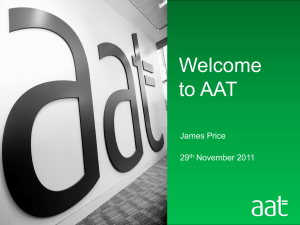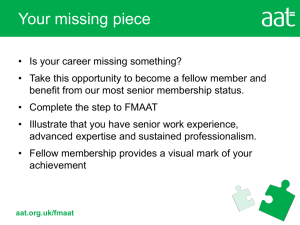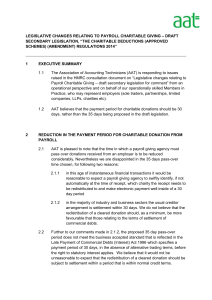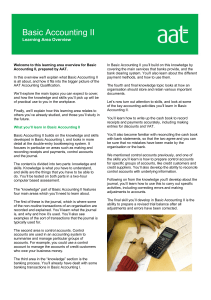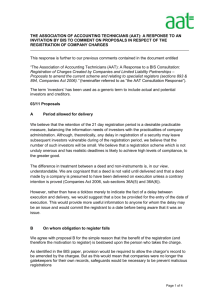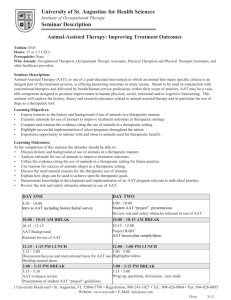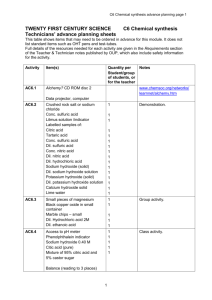FRED 52 draft amendments to the Financial Reporting Standard for
advertisement
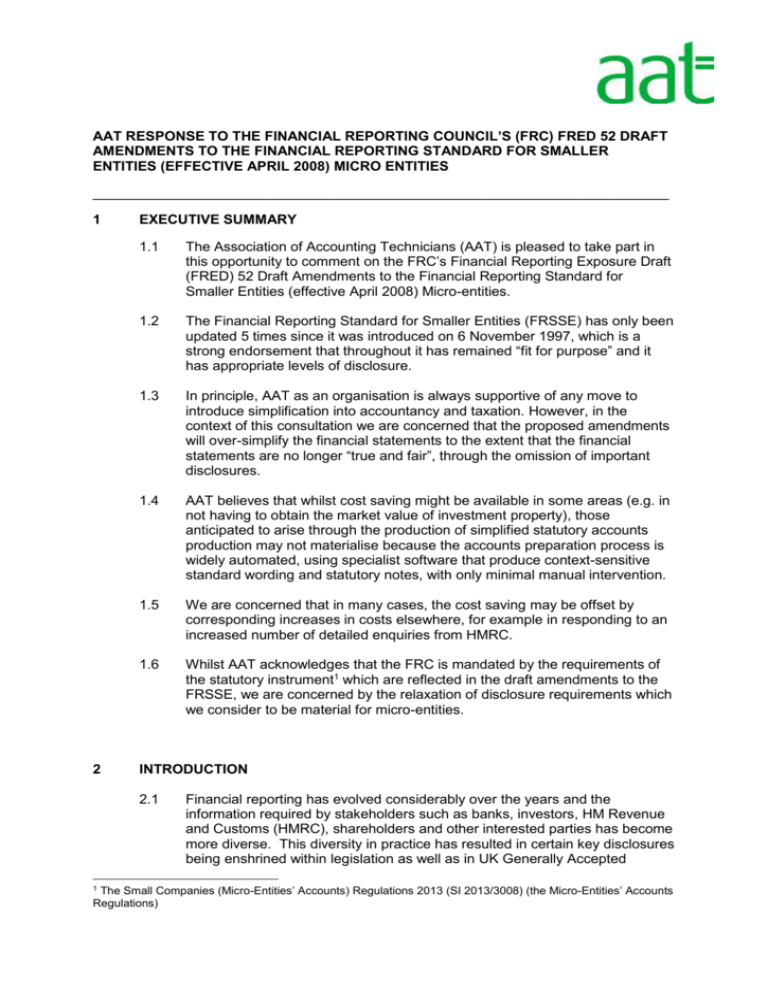
AAT RESPONSE TO THE FINANCIAL REPORTING COUNCIL’S (FRC) FRED 52 DRAFT AMENDMENTS TO THE FINANCIAL REPORTING STANDARD FOR SMALLER ENTITIES (EFFECTIVE APRIL 2008) MICRO ENTITIES _________________________________________________________________________ 1 2 EXECUTIVE SUMMARY 1.1 The Association of Accounting Technicians (AAT) is pleased to take part in this opportunity to comment on the FRC’s Financial Reporting Exposure Draft (FRED) 52 Draft Amendments to the Financial Reporting Standard for Smaller Entities (effective April 2008) Micro-entities. 1.2 The Financial Reporting Standard for Smaller Entities (FRSSE) has only been updated 5 times since it was introduced on 6 November 1997, which is a strong endorsement that throughout it has remained “fit for purpose” and it has appropriate levels of disclosure. 1.3 In principle, AAT as an organisation is always supportive of any move to introduce simplification into accountancy and taxation. However, in the context of this consultation we are concerned that the proposed amendments will over-simplify the financial statements to the extent that the financial statements are no longer “true and fair”, through the omission of important disclosures. 1.4 AAT believes that whilst cost saving might be available in some areas (e.g. in not having to obtain the market value of investment property), those anticipated to arise through the production of simplified statutory accounts production may not materialise because the accounts preparation process is widely automated, using specialist software that produce context-sensitive standard wording and statutory notes, with only minimal manual intervention. 1.5 We are concerned that in many cases, the cost saving may be offset by corresponding increases in costs elsewhere, for example in responding to an increased number of detailed enquiries from HMRC. 1.6 Whilst AAT acknowledges that the FRC is mandated by the requirements of the statutory instrument1 which are reflected in the draft amendments to the FRSSE, we are concerned by the relaxation of disclosure requirements which we consider to be material for micro-entities. INTRODUCTION 2.1 Financial reporting has evolved considerably over the years and the information required by stakeholders such as banks, investors, HM Revenue and Customs (HMRC), shareholders and other interested parties has become more diverse. This diversity in practice has resulted in certain key disclosures being enshrined within legislation as well as in UK Generally Accepted The Small Companies (Micro-Entities’ Accounts) Regulations 2013 (SI 2013/3008) (the Micro-Entities’ Accounts Regulations) 1 Accounting Practice (UK GAAP) to ensure that general purpose financial statements communicate key information about a reporting entity that satisfies a range of needs and achieve the objective of financial statements as laid down in the Statement of Principles. 3 2.2 Although the FRSSE was introduced in 1997, it has only seen five updates in its lifetime to ensure it is relevant to its target audience, being small companies. The accountancy profession welcomed the introduction of the FRSSE as a means of simpler financial reporting for small companies and continues to place a high regard on the FRSSE, which is testament to the FRSSE’s ease of use and appropriate disclosure levels for its target audience. 2.3 Whilst AAT is a keen advocate of simplification, as demonstrated within our responses to the FRC’s question in FRED 52 (paragraphs 3.1 to 3.17) we also recognise the need to ensure financial statements for entities classed as small or micro continue to convey the appropriate levels of information. 2.4 We further recognise the need for transparency for external stakeholders and the importance of ensuring financial statements give a true and fair view; a concept which has been enshrined in company law for many years. 2.5 Whilst the financial burden associated with the cost of producing statutory accounts imposed on companies, particularly in the current economic climate, is a concern, we believe that any potential cost-savings envisaged by the Department for Business Innovation and Skills (BIS) must be weighed against the requirements of members and key stakeholders and also keep in mind the objective of financial statements laid down in the Statement of Principles issued by the previous Accounting Standards Board and recognise the concept of ‘Limited Liability’ in company law. RESPONSE TO QUESTIONS FOR RESPONDENTS Question 1 Do you agree with the proposed amendments to the FRSSE for micro-entities? If not, why not? 3.1 As previously observed (2.3) AAT is supportive of moves to simplify financial reporting requirements. Especially, for entities that would fall to be classified as a micro-entity under The Small Companies (Micro-Entities’ Accounts) Regulations 2013. AAT recognises that some disclosure requirements currently in the FRSSE (effective April 2008) and the FRSSE (effective January 2015) are unnecessary for companies that would qualify as microentities. 3.2 However, we are concerned that the proposed disclosures will result in financial statements that fail to meet s.393 of the Companies Act 2006 (s.393) requirement that they give a true and fair view. 3.3 Furthermore, we believe that the above is further compounded by the fact that the draft amendments do not include items which are considered by us and many others to be of a material nature to a micro-entity set of financial statements, including: 2 A lack of director(s) remuneration disclosure (transactions with directors are considered to be material in nature as well as in monetary terms); No requirement to disclose related party transactions; No requirement to disclose any going concern issues (which AAT feels is particularly relevant in difficult economic climates) and material post balance sheet events; and No requirement to disclose material exceptional items which may be encountered by a micro-entity during the year. 3.4 The relaxation of disclosures in respect of items which are considered to be material in nature to a micro-entity and hence that are likely to result in the production of financial statements which do not give a true and fair view runs counter to the principles of limited liability. 3.5 It is our opinion that reporting entities that enjoy the limited liability protection afforded to them under company law have a duty to make certain disclosures for the privilege of such protection. We are, therefore, concerned that the proposed draft amendments to the FRSSE will not offer sufficient transparency to interested stakeholders. 3.6 Whilst abbreviated financial statements (in their current form) filed with the Registrar of Companies are not intended to give a true and fair view, and hence contain very few disclosures, many of the disclosures that might be withdrawn if the draft amendments are adopted are there to ensure financial statements give a true and fair view which interested external parties, such as HMRC and banks, can trust. 3.7 The European Union has introduced the micro-entities legislation2 in a commendable attempt to reduce the burdens placed on small companies with a view to cost-reductions. Whilst AAT cannot accurately quantify any costsavings made by businesses as a direct result of the exemptions contained in the micro-entities legislation, we remain to be persuaded that cost-savings in reality exist. 3.8 Our inability to deduce where the expected cost savings might arise can, perhaps, be best explained by the fact that the draft amendments to the FRSSE do not affect the recognition or measurement of amounts recognised in the financial statements themselves, they merely reduce the levels of disclosure notes contained in the financial statements. This is something which is largely taken care of by automated accounts production software programs and as a consequence actually has little if any cost consequence to the small or micro entity. 3.9 Whilst some time is clearly spent by accountants in respect of disclosure notes so as to comply with the requirements of existing FRSSE, the extensive Directive 2012/6/EU of the European Parliament and of the Council disclosure reductions contained in the draft amendments to the FRSSE will undoubtedly increase costs for micro-entities in many cases. 4 3.10 HMRC is one of the key interested stakeholders who, if the draft changes were adopted, would still require a ‘full’ set of micro-entity financial statements in order to assess corporate tax liabilities. 3.11 AAT is of the opinion that HMRC enquiries into corporate tax returns would increase on the basis that micro-entity financial statements would no longer contain the level of information required by them. 3.12 If the scenario outlined in 3.11 proved to be the case any cost-savings achieved by the proposals would be outweighed by costs incurred during the course of responding to HMRC enquiries. 3.13 AAT is further concerned in respect of micro-entities who are reliant on bank, or other means of, finance to operate. Many banks and finance houses require full financial statements to be submitted to them so they can assess the financial viability of such companies. 3.14 In such instances financial statements containing significantly reduced disclosure notes are likely to affect the credit-rating of such entities which may have a detrimental effect on lending decisions or renewals of borrowing facilities. 3.15 In addition, banks and finance houses may also request non-statutory financial information for their own purposes which, again, would see costs for the business increase as a direct result of the significant disclosure reductions. 3.16 AAT acknowledges that there are cost-savings to be made for micro-entities that may have investment properties on their balance sheet as the draft amendments to the FRSSE will withdraw the use of the revaluation model for investment. If the proposed change was to be adopted the removal of the requirement to pay for annual revaluations will be welcomed by micro-entities. 3.17 Transitional provisions will need to be clarified as to whether the latest revaluation that has been incorporated within the financial statements can be used as deemed cost or whether such investment properties should be restated to depreciated historic cost. AAT is of the opinion that fair value is more reliable than depreciated historic cost and therefore the latest revaluation should be used for transitional provisions. CONCLUSIONS 4.1 AAT has identified that the needs of external users of the financial statements remains the primary concern and that the true and fair concept in company law must prevail. 4.2 Whilst abbreviated financial statements submitted to the Registrar of Companies and which are available on the public record, are not intended to give a true and fair view, full financial statements must comply with s.393. 4.3 AAT is concerned that the proposed ‘full’ micro-entity financial statements will fail to give a true and fair view, despite the presumption in legislation that such accounts will, on the basis that the following disclosures, considered material in nature, no longer apply to micro-entities: 5 3 Directors’ remuneration and other benefits; Related party disclosures; Going concern and post balance sheet events disclosures; and Exceptional items. 4.4 Whilst cost-savings are identifiable in the draft amendments (such as the nonrequirement to obtain the market value of investment property at the balance sheet date by a valuation agency), AAT is of the opinion that such savings (in a relatively small number of cases) will be outweighed by the requirement to satisfy the needs of external parties (such as HMRC and financiers) by providing non-statutory financial information to ensure an appropriate level of transparency is maintained. 4.5 We believe that the latest revaluation incorporated in the financial statements of a micro-entity holding investment property on its balance sheet would be a most appropriate valuation. However there will be a need for the FRC to provide additional guidance to preparers of micro-entity financial statements relating to the transitional provisions considered necessary in relation to investment properties. ABOUT AAT 5.1 The Association of Accounting Technicians (AAT) is pleased to take part in this opportunity to comment on the FRC’s Financial Reporting Exposure Draft (FRED) 52 Draft Amendments to the Financial Reporting Standard for Smaller Entities (effective April 2008) Micro-entities. 5.2 AAT has 50,0003 Members and 80,0001 Students worldwide. 5.3 AAT has over 3,900 Members in Practice who provide accountancy and taxation services, including assisting companies to meet their statutory filing obligations, to over 300,000 sole traders, partnerships and limited companies, covering a full range of businesses, particularly small and medium sized enterprises and owner managed entities. Figures correct as at 31 December 2013 If you have any questions or would like to consult further on this issue then please contact the AAT at: email: consultation@aat.org.uk and aat@palmerco.co.uk telephone: 020 7397 3088 FAO. Aleem Islan Association of Accounting Technicians 140 Aldersgate Street London EC1A 4HY
